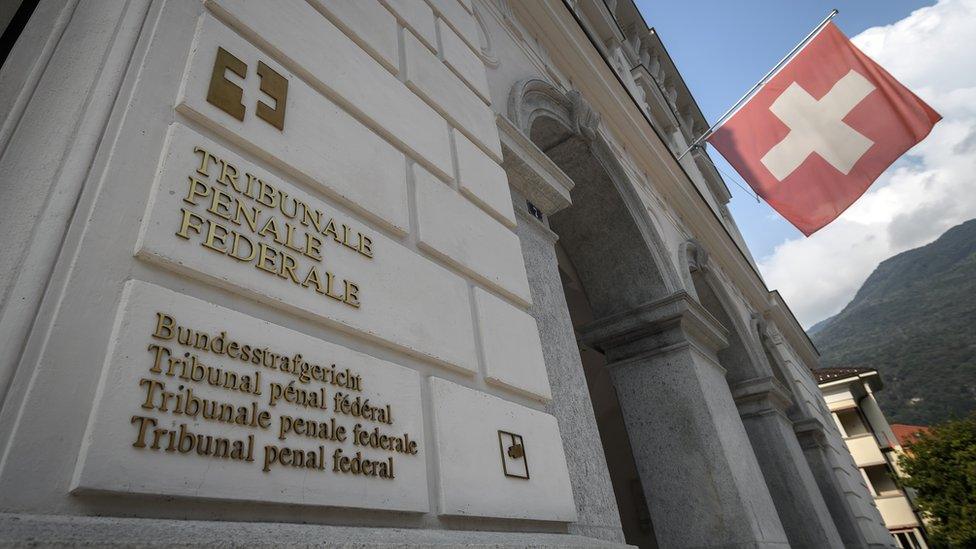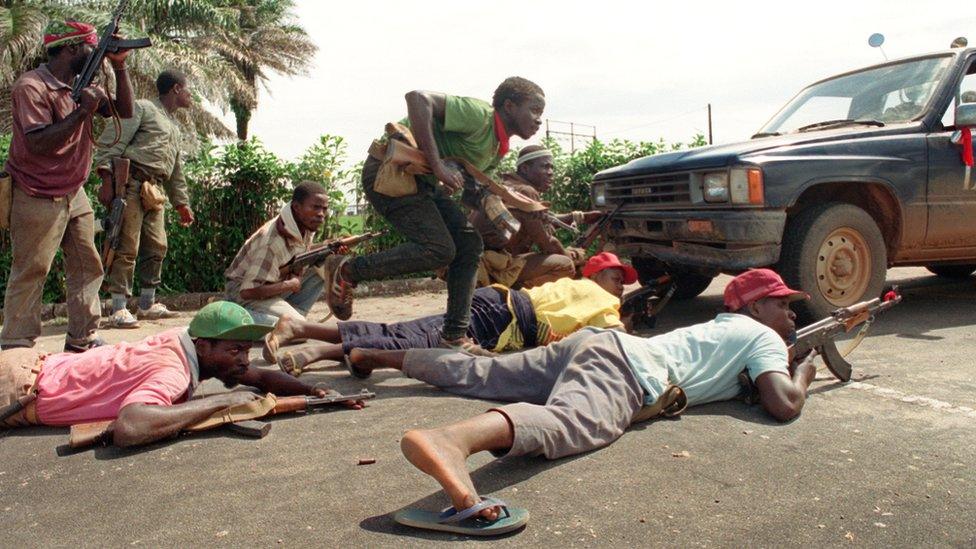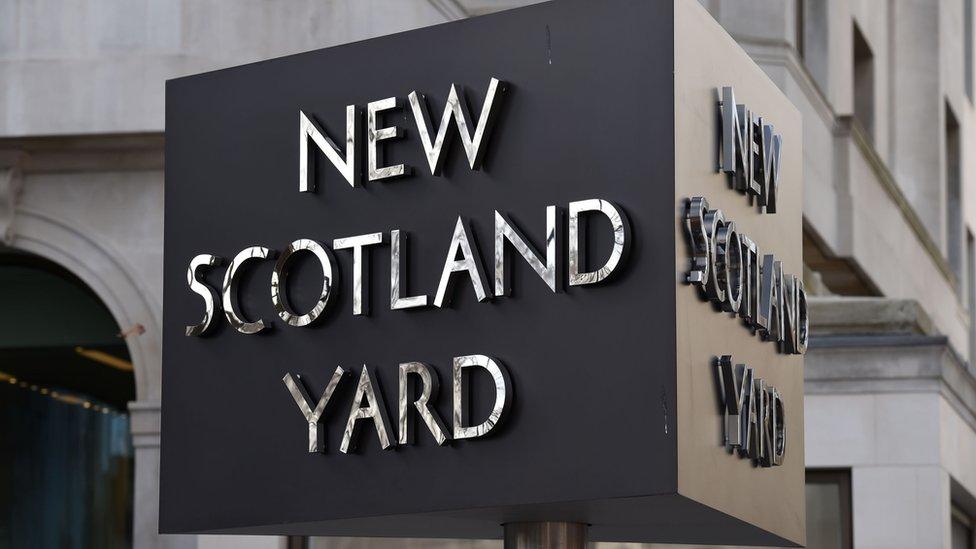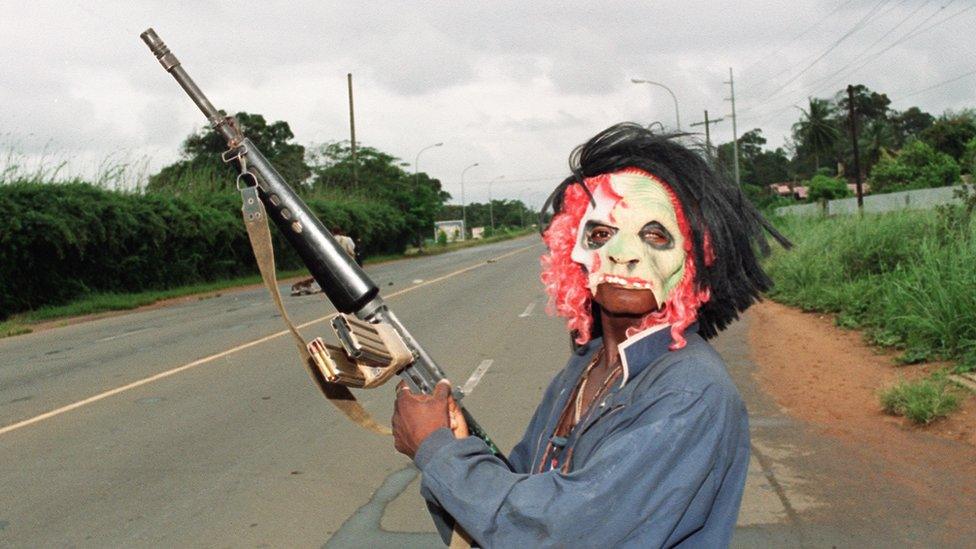Alieu Kosiah: Liberian ex-commander faces war crimes trial
- Published

It is the first time war crimes charges have been heard by a Swiss civilian court
A former Liberian rebel commander has gone on trial in Switzerland over alleged atrocities committed during the country's long-running civil war.
Alieu Kosiah, 45, is accused of murder, rape, recruiting child soldiers and a host of other crimes.
The former rebel commander, who fled to Switzerland before being arrested there in 2014, denies the charges.
Around 250,000 people were killed in Liberia's civil wars, and many thousands more fled the fighting.
Consecutive conflicts raged in the West African country between 1989 and 2003.
The trial in Switzerland, which began on Thursday, is the first under a 2011 law that allows prosecution for war crimes committed anywhere in the world. It also marks the first time war crimes charges have been heard by a Swiss civilian court.
Switzerland recognises the principle of universal justice, meaning people suspected of committing high-profile international crimes elsewhere can be tried in its courts.
Mr Kosiah is the first Liberian to face trial over war crimes committed during the country's first civil war between 1989 and 1996, according to Human Rights Watch. However, he was not one of the most high-profile militia leaders during the conflict.
No Liberian has ever been convicted of crimes committed during the conflict. The country's former leader Charles Taylor was, however, convicted in 2012 of committing war crimes in neighbouring Sierra Leone.

Why haven't Liberians faced war crimes trials?
By Jonathan Paye-Layleh, Monrovia
In 2008, Liberia's post-war truth commission recommended an amnesty for a few people connected to the fighting because they told the truth and expressed remorse when they faced the commission.
But dozens of others were recommended for criminal prosecution.
This has not been taken seriously by successive governments and there is little political will to make this happen.
Former President Ellen Johnson Sirleaf could not and did not talk about war crimes trials because she was one of over 50 politicians recommended to be barred from holding public office because of their roles in the war. She denied any wrongdoing.
Current President George Weah was expected to ensure that there would be trials because he is regarded as not having played a role in the war.
But he says Liberians are related and he has shown no interest in a war crimes court.
And some of the warlords are in key positions in government.
Prince Johnson, whose rebels captured and brutally killed President Samuel Doe in September 1990, has been a senator for Nimba county since the first post-war election of 2005.
He is now a strong and supportive ally of President Weah.

The trial is being held at the Swiss federal court in the southern city of Bellinzona.
Mr Kosiah was arrested after a civil rights group presented the Swiss attorney general with evidence of his involvement in war crimes, including the deliberate killing of civilians, sexual violence, abuse of corpses and acts of cannibalism.
The court lists the charges against him as "recruitment and use of a child soldier, forced transportation, looting, cruel treatment of civilians, attempted murder, murder (directly or by order), desecration of a corpse and rape".
The indictment, seen by Reuters news agency, says Mr Kosiah was involved in the killings of at least 18 civilians and also recruited a 12-year-old as his personal bodyguard.

Around 250,000 people were killed in Liberia's two civil wars
The crimes allegedly took place while he was fighting with Alhaji Kromah's United Liberation Movement of Liberia for Democracy rebel group against Charles Taylor's troops in the remote Lofa County in the 1990s.
But a lawyer for Mr Kosiah said his client was not present in the area when the alleged crimes were committed. "One of the big problems with this case is he had not yet arrived in Lofa at the time," Dimitri Gianoli told Reuters.
Miatta, former child soldier in Liberia: "I know I killed people"
The trial has been postponed several times because of the coronavirus pandemic, and lawyers for the victims have opposed a decision to delay their hearings until next year. "After the unspeakable things they went through during the war they deserve to be present," one lawyer said.
"We... asked that Kosiah's hearing be delayed until 2021 so that our clients, the victims, could be present," another lawyer, Romain Wavre, told AFP news agency.
The court is reportedly considering hearing testimonies from the victims via video link, although this has not been confirmed.
Related topics
- Published27 August 2020

- Published12 February 2018
